Written by California Conversations
Published Issue: Summer 2008
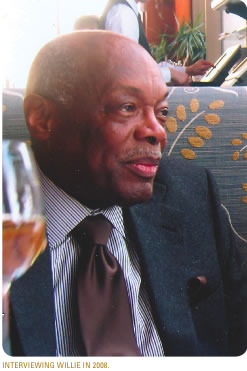 At seventy-four there are more stories than ambitions, and more memories than adventures waiting. Still, there is nothing dated about him and he remains very much a man of his times. He is a go-to guy. He is a consultant for people who want to get things done-different things-get elected, run legislation, meet someone who is difficult to reach, or build a new building in a place where it isn’t always easy to get the permits green-lighted.
At seventy-four there are more stories than ambitions, and more memories than adventures waiting. Still, there is nothing dated about him and he remains very much a man of his times. He is a go-to guy. He is a consultant for people who want to get things done-different things-get elected, run legislation, meet someone who is difficult to reach, or build a new building in a place where it isn’t always easy to get the permits green-lighted.
The finely tailored clothes he wears could only belong to a banker if the banker actually owned the bank. He is impeccable.
His large head is cleanly bald, his eyes, rumored to be weak, don’t miss a thing and their soft, dark coloring seems to capture light and reflect his mood. His voice is naturally modulated from decades of controlling his environment. He is easily heard no matter what is happening around him. The people walking past his table in the restaurants stare at him, the recognition of a celebrity, and the more daring of them stop to say how honored they are to meet him. He has a great smile. His teeth are very white. His laugh is kid-like, a delight in the moment, the kind of laugh that makes those who stop no doubt talk to their friends and family about how much fun it was to have his attention long enough to shake his hand.
He saw greatness in others once. He understands completely why people see it in him. He is lionized now, the former Mayor of the City, the great old man of the California Legislature. The hundreds who served under him during his tenure as the longest running Speaker in the 160 years of state history all like to tell stories of when they were in his company.
His name is Willie Brown.
There are presidents from California who will be remembered first-Reagan and Nixon, and Hoover who transplanted to Stanford and spent a long dotage, something not even hinted at with Willie, trying to make sense of how the depression snuck up on such a bright white guy with a stiff collar. There are governors, Hiram Johnson; Earl Warren, the visionary; Pat Brown, the modernist; Reagan, again, and maybe Schwarzenegger and the experiment that is still open ended, who might get bigger billing.
None of them is more California, closer to the people and the places people live, than Willie Brown. Willie understands how politicians get into office. He realized early what should have been obvious-that not all politicians are the same. They might get painted with the same cheap brush, however the conservative yachtsman from Orange County and the activist from an urban center have nothing in common except for more than three decades if they wanted to be effective at the Capitol, they needed to deal with Willie. And, with acumen unquestioned, Speaker Brown mastered the quiet maneuvering of thousands of bills that both shaped and twisted the growth of California. It took an initiative, one that made him the villain poster child, to end his reign by saying term limits made more sense than discretion at the ballot.
Willie has never been reclusive. He is ubiquitous during elections and much in demand by talk shows across the country when a weighted opinion is needed. Usually he translates well, although a back room is difficult to re-create and it is not always evident to see the ease with which he directed his House. There is also something odd about seeing someone other than Mr. Brown asking questions from behind a desk.
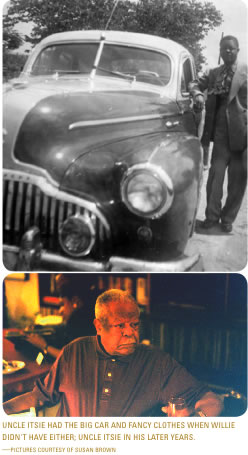 His recent biography was well-written. California Conversations made a gift of the book to hundreds of our friends. Yet, we missed some details.
His recent biography was well-written. California Conversations made a gift of the book to hundreds of our friends. Yet, we missed some details.
These are the notes we took from our conversations with Willie.
We begin with his Uncle Itsie, his mother’s brother, a marvelous figure from Willie’s childhood, a flashy, fabulous guy who showed up periodically in impoverished Mineola, Texas to let Willie know a place like San Francisco actually existed.
Unfortunately, neither Willie’s book nor the key biography written about him ever say much about Itsie other than his inspiring Willie with his fancy car and sharp clothes.
At 87 years of age, Itsie and one of his buddies were gambling. They used to gamble for 36-48 hours non-stop. They would order room service, or they would order take-out. They would play cards or do whatever they were doing in the gaming sense. On this occasion, the people in the building in which he lived called me and said you better come over here quick. One of our people rang the doorbell and found your uncle passed out and his companion appears to be dead.
I rushed over. When I got there, Itsie was conscious. I said, “Itsie, what happened?”
He said, “I don’t know. Ben and I started playing cards yesterday. We were drinking and we kept drinking and we kept drinking. The last thing I remember was that Ben made a bet. When they woke me up, Ben was leaning over. He wasn’t moving, so I called his bet. Ben didn’t say anything, so that means I won.”
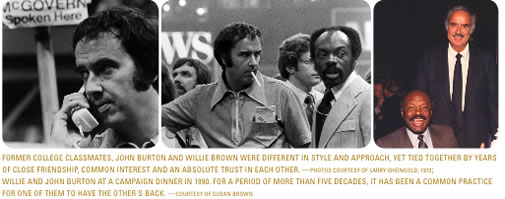
He was a funny, funny, guy. At about ninety, I absolutely insisted that he stop living alone, because he was getting to the point where some days he didn’t walk well. I got a call from the people running the building and they said the cops went up to your uncle’s unit. You better get over here and find out what’s going on. I got there, and the cops were already gone. I said, “Itsie, why were the cops here?” He said, “You know, I went down to the club, and I met this lady. She came home with me. She didn’t want to leave, and I don’t want nobody staying in my house overnight.”
I took him home for my mother’s birthday in Dallas. He was carrying a suitcase that was rattling. I said, “Itsie, what the hell is in that suitcase?” He says, “It’s Remy.” He drank Remy Martin. I said, “Why are you carrying all that Remy?” He said, “I was on my way to the airport and I ran into a buddy of mine who had some Remy he wanted to sell. And I bought it. I couldn’t trust him to take it to my house. He’s a thief.”
Itsie left his clothes, and toiletries and everything behind. He sent them back home via the thief. He carried the Remy with him instead.
Uncle Itsie died. He got old. He was 92. I called a friend of mine and asked if we could have the funeral at his church. I admitted that Itsie had never been to church in his life, but in memory of my mother I wanted to have a church service. The minister agreed. So, I brought the body in, and some of Itsie’s buddies and a few family friends and a lot of my friends, because they knew Itsie, showed up.
The minister began his sermon and he described Itsie as a good man who lived this honest and honorable life in service of the Lord...the preacher was talking about how he hoped the Lord would see the situation...well, I got up and unlike the preacher I don’t have any equity with the Lord and I said, I’ve got to tell you people something. If I had just walked into this church and heard this description of my Uncle I would have asked, “Is that the right guy in the casket?”
John Burton
John Burton has spent his lifetime in the tumble of San Francisco politics. He was elected at an early age to the State Assembly, and went to Congress until a cocaine addiction was thought to end his career. He proved his political resilience by being elected again to the State Legislature, and eventually was chosen by his peers to be the President pro Tempore of the California Senate. He can be alternately brilliant and boorish. In style and approach he is almost a deliberate antithesis to Willie. He was the younger brother of the once impressive Burton Political Machine, and is deservedly credited for his tireless efforts on behalf of the easily ignored.
We were college classmates at San Francisco State College. We were each enrolled for deferment purposes in the Air Force ROTC. When you initially enrolled, they put you into a drill squad, a decision not based on height, not on weight, but on alphabetical order. It was Brown, Burton, and we were elbow to elbow. At that time, he was running the football cards on campus. We called them football cards, but they were betting cards. He was running that operation. I was a betting man, and that’s how we became friends. From there he introduced me to his older brother, Phil, who was already running for office. It became, frankly, a natural friendship. Burton hasn’t changed from day one. Burton was the only white player on a championship basketball team-surrounded by black athletes from the playgrounds of San Francisco. He was a great player. He literally was the playmaker. He was an outside shooting guard. In those days you got playground jobs with Park and Rec, not Civil Service. If you were an athlete that is how you got subsidized. Burton had one of those jobs. Burton was very much a part of the African-American component at the University. He was very much a part of the wild end. He was very much a part of the political end. I don’t think he’s ever been what you might call Mr. Smooth, and I don’t think he’ll ever be Mr. Smooth. It’s been more than fifty years of friendship. I lent Burton the first down payment he ever made on a house. We’ve done a great deal together, and I choose to remember it as always being fun.
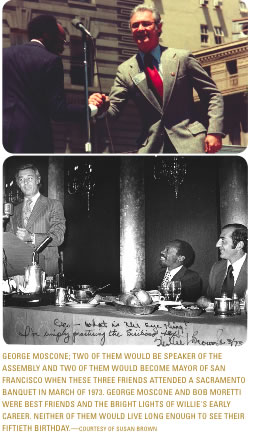
George Moscone
George Moscone was one of the most successful California politicians in the 1970s. A tall, very handsome man with a graceful speaking style and a compelling, smart-star personality, he became a leader in the California Senate and was Mayor of San Francisco when he was assassinated on November 27, 1978.
George Moscone was the smart one among us. Burton, Brown, Moscone were all in law school together. Burton eventually transferred to USF. Moscone and I graduated from Hastings College of Law. Moscone was the debonair, handsome, charming, polished, real son of San Francisco. You couldn’t be any more of a son of San Francisco than to be of Italian heritage and associated with the garbage companies that owned and operated much of that component of the city. He was an all-city basketball player, and he was uniquely friendly with John Burton because of the basketball connection. That’s how I became a great friend of George Moscone, and we did literally everything together-we’d go skiing and get together with our kids for different holidays. He was one of the favorite people in my life.
When he was mayor we would oftentimes go to bars, and sometimes he would have more than he should, and drinking tended to make George combative. He was...I should say less tolerant, because there was a high degree of racism still in existence and on display, and invariably it would be triggered by the salt and pepper appearance of Brown and Moscone. And if there was any, not even malicious, insults, and there often were of me, you were in for having to duke it out with George. He threw punches. My job was to not get our asses whupped on any given day.
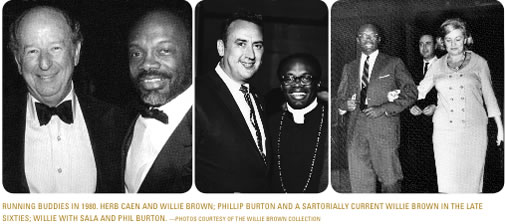
He was a guy who loved life like you wouldn’t believe. He was hip in every category. He loved playing trivia, very much into sports, very much into music, into clothing, into cars. Women found him worthy company. People literally stopped what they were doing when he walked into a room. He drove an off-pink Alfa Romeo.
Other than Dan White (the assassin), I was the last person to see George. It was not a significant conversation. I turned down staying to have a cup of coffee while he told Dan White he would not be able to reappoint him as a supervisor because once you resign, it’s a done deal.
Subsequently, I learned that Dan White had a list of people he intended to assassinate, and my name was on that list.
When I think of George, I think about that incredible smile, that superior brain, and that enthusiasm for life...food, wine, and other things. I miss him.
Herb Caen
The master of ‘three dot journalism,” Herb Caen’s legendary Chronicle column of short features made him the person people read when they wanted to understand San Francisco.
Herb was a genius beyond belief. He was eclectic in his tastes-the arts, politics, food, music, clothing, the opera and the symphony. Nobody lived a fuller life, twenty-four hours a day, seven days a week than Herb Caen. Whether it was playing tennis, going to the Giants baseball game, going to the 49ers football game, going to the Fillmore to watch Santana, going to a movie and getting up and walking out in the middle of the movie because it was horrible, going on a structured operation to find the best cheeseburger in San Francisco, going to a memorial service and deciding the people speaking are phony and grabbing me and dragging me out of there because we don’t want to be hypocritical...always up to something...surly, not at times! Surly all the time and particularly surly when someone tried to pick up the check because of the assumption that columnists want someone paying for them. He didn’t want anybody picking up the tab. I don’t mind that. I don’t have that issue.
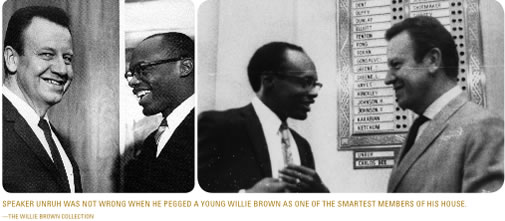
Phil Burton
A case can be made that Phil Burton was the first modern California politician. He was six years older than John and eight years older than Willie. One of the true giants of the California congressional delegation, Phil lost his first race to a dead man and, because of his obstreperousness, he missed out on becoming one of the leaders in Congress when he failed to get the support he needed from his own California colleagues. He died suddenly in 1983 when he was only fifty-seven. His legacy includes being a leading environmentalist, an ardent advocate for the poor, and the first member of Congress to acknowledge and confront the consequences of the AIDS epidemic.
Phil Burton was the architect of the career of his brother John, the career of Mayor Moscone, and the career of Willie L. Brown, Jr., the career of his wife Sala and the career of Speaker Nancy Pelosi.
He was not fun in the normal sense, but fun for political junkies. Phil Burton was the brightest politically among all of us, the more focused politically. He never awakened before eleven o’clock in the morning. He did not grant media interviews to anybody. He spent full time learning every congressional district in the country better than the person representing that district. He literally was better than any computer, faster, more efficient, and his data bank was more extensive, and his ability to recall was superior.
He had greater interest in the subject matter of socially useful programs for disadvantaged people than probably anybody else in America, and he was more clever at being able to achieve it. He was a guy who took no prisoners in pursuit of his political agenda. He didn’t need anything or anybody. He understood clearly, however, that in the exercise of power it was ludicrous to assume that in every instance he could be a member of the Assembly, he could be a member of the State Senate, he could be the mayor. He had to find allies who were equally, in his judgment, imbued with his commitment.
He was abrasive, but not malicious. It was just Phil, who between the close of his official duties and four a.m. would consume as much vodka as was available in whatever establishment he was sitting. He was never a drunk in the sense of dysfunctional. Burton had a capacity for food and beverage that was virtually inhuman. It did not alter his thinking capacity or his functioning ability. He could be as much an asshole at eleven in the morning as he was at eleven at night.
Jesse Unruh
He became infamous as Big Daddy, a three hundred pound politician who befriended the Kennedys early and was the first Speaker of California’s fulltime Legislature. He would eventually slim down, run against Ronald Reagan for Governor and become a very effective State Treasurer.
Jesse Unruh was as smart as Phil Burton, craftier than Phil Burton, and less committed to poor folks than Phil Burton. He was also far more acceptable to the commercial world than Phil Burton would ever be. Jesse Unruh was smart enough never to tell, for example, the leaders of some energy company to go fuck themselves. Phil Burton would open his conversation with that dialogue. Although they may end up in the same place, Unruh would lull a person into acceptance while Phil would beat him into acceptance.
Unruh was a man who loved country western music. He loved dirty jokes and stories of that nature. He had a real propensity for dissecting other human beings, and he loved being able to do that with people he trusted. They’ve said it more cheaply about others, but he truly was a consummate politician.
Harvey Milk
Supervisor Harvey Milk was murdered just moments after the killing of George Moscone. The first openly gay politician to hold a major office, he is also the subject of a soon to be released Sean Penn movie.
I knew Harvey Milk very well. I think, had he lived, Harvey would have moved the gay community in a direction less progressive than it currently is. He was interested in building consensus while pushing gay issues for legal acceptance. He would not require the kind of militant commitment from others that some gay activists currently do, and he would probably be subject to that criticism. He was a very nice guy, and enjoyable to be around. He was incredibly smart, a wonderful sense of humor, a person who wanted to accomplish something and not just make a statement. He was practical. It would have been interesting to see how much he could have accomplished in many areas of public policy.
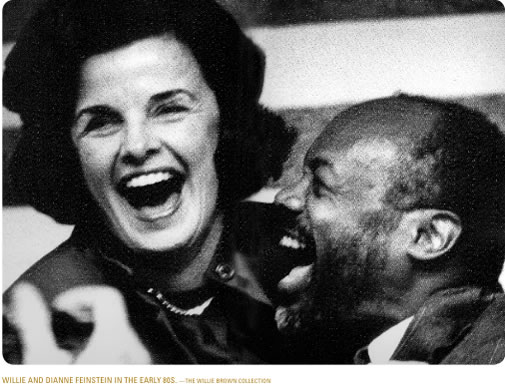
Dianne Feinstein
She announced the killings of Moscone and Milk and in that moment displayed the perfect mix of compassion and control. She has made her mark as the senior senator from California.
If Harvey and George had not been killed, there would not have been the second chapter or third chapter for Dianne Feinstein. She was finished. She lost the election for mayor to George. Dianne would have gone a different direction, because there would not have been a platform to launch her career.
I was the only elected official to endorse Dianne Feinstein for the Board of Supervisors in 1969. Dianne walked the picket line in my efforts to integrate housing in Forest Knolls in the early ‘60s. So, I knew Dianne reasonably well, and I knew her first husband, a great guy. I gave him my tickets to the Cal games because he was big on them. I’ve always preferred professional sports.
I was one of the few people sitting in her living room orchestrating how we get the votes to get her into the role of the interim mayor, a replacement for the remainder of George’s unexpired term. She was automatically by charter the acting mayor, but she had to be voted upon by her colleagues to be the interim mayor. Then I became one of the instruments that helped her beat Quentin Kopp in the race for a full term, Quentin Kopp was incredibly strong. In the primary, they were separated by one or two percentage points, maybe more, and she was an incumbent. The results looked dim for her. We put together an operation that resulted in an increase in the Black vote, an increase in the public housing vote and the results were that Dianne won.
I liked Dianne then. And I still like her.
Ronald Reagan
Actor, Governor, President and iconic American figure.
Charming, clever, smart, deal maker and probably as everybody says the best at presenting himself to the public in a favorable light. I wish I had that skill. I think people who didn’t know Reagan, would have to ascribe to him qualities separate and distinct and far more favorable than other politicians. He never presented any of the negatives of a politician. Never. Never. There was never an occasion when anything that he did or said could be interpreted as being negative. I am not at all surprised by the incredibly admiring view people have for him and his time in the presidency.
Many times we would be the last two persons standing, so to speak, at a lunch or a dinner or in a space around the trains. But it was not like we were programming what we were going to do next. We operated in different circles.
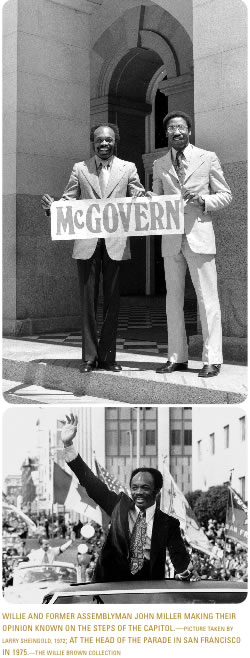
Bob Moretti
He was elected Speaker of the Assembly when he was only 34 years old. At a time when politics was the domain of tough professionals, Moretti excelled.
Bob Moretti was my real buddy. He was the most trusting guy of me that I ever had an occasion to meet. He was also the guy that had the least amount of ego problems with taking your advice and counsel and giving you credit for it. He was so naturally talented. It wasn’t just that he was smart, he had the kind of personality that made people comfortable when he sat down and talked to you quietly. He was extremely capable. He was also a prankster of the worst order. He would spend a great deal of time trying to figure out how to vex you just for sport.
He died very young on the tennis court. His family, the bloodline, had small, small blood vessels, sometimes not any thicker than a strand of your hair in their circumference, and that kind of a blood vessel can easily become clogged and in the right place, stop you instantly. That’s what happened. He was wonderful company. I miss him a great deal.
Wilkes Bashford
Wilkes Bashford, the clothier, and by himself a San Francisco institution, has a standing lunch appointment every week with Willie. Herb Caen was part of the group, as are an interesting handful of longtime friends, one nicknamed Sir Lunchalot, and all of them accomplished in their own fields.
My goal is to live long enough to eulogize all of my friends. Unfortunately, I won’t outlive Wilkes. He takes very good care of himself.
When I went into Wilkes’ first store in the early sixties I bought a suit for $395. The last suit was $8,000. Needless to say, I don’t buy them like I used to.
Wilkes was always part of our group, except we didn’t run around with Wilkes. Wilkes was never speedy enough to hang, because he didn’t have any great interest in football or baseball or basketball, or some aspects of music. Wilkes was urbane in every sense of the word. Herb and I would sneak out of a symphony at intermission. Wilkes likes those four-hour performances. Wilkes considers us somewhat uncouth, but tolerable. We really couldn’t do, frankly, without him and he couldn’t do without us, because we were his best walking ad pieces. Our weekly lunches at Le Central are where we literally dish the whole world, including ourselves, and if you are not there, you get trashed. You show up out of sheer protection.
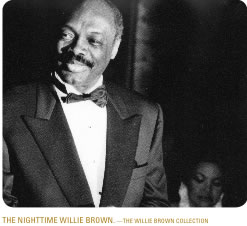
Blanche
Willie has been separated for more than half of his fifty-year marriage to the beautiful Blanche. His private life has not always been that private, and his mutual affection for women is not a closely guarded secret.
I just talked to Blanche this morning. I’ve written about the voodoo thing...she is a goddess in the Brazilian religion. She is really very high up, a priestess or goddess. I don’t know what you call it. She resents me teasing her...you know, where’s the chicken you killed this morning...she doesn’t like those kinds of jokes at all, because she’s serious about her religion.
She has lived the same full life I’ve lived. I don’t get jealous or pass judgments. It’s a waste of time passing judgment on anybody, including yourself. No harm, no foul. I talked to her this morning, because I’ve got my Mercedes in storage on the waterfront and I don’t want to keep paying that bill. She lives in Oakland and she has a carriage house and she’s been lobbying like hell to get her hands on that Mercedes. It’s a golden car. It’s a SL600. It’s a 1994 and has fewer than 25,000 miles on it. So, it’s virtually a new car. It’s an absolutely gorgeous convertible with a hard top. I saw her yesterday at my granddaughter’s two-year birthday party. I told her I really think she should come get the car. Blanche finally gets the goddamn Mercedes.
Kathleen Cleaver
The Black Panthers began meeting in a small house across the bridge from Willie in Oakland, California. At their most influential, Willie was the most prominent Black politician in California.
I represented the Black Panthers as a lawyer. In 1968, Kathleen Cleaver, wife of Eldridge Cleaver and a distinguished law professor in her own right, ran against me. It was like any other race. She lost badly. It was not difficult for me to balance at times the militancy of the Black Panthers and my position as one of the few Black elected officials. You are far more comfortable in the art of making public policy if you figure out what’s right and then you sell it, rather than trying to figure out what people think is right and you adopt it.
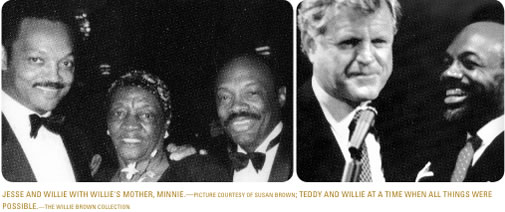
Leon Ralph
Willie lost the first time he ran for Speaker of the Assembly. Almost thirty-five years later, the reason for the loss and the residual acrimony remain fresh.
Leon Ralph cost me the speakership in June of 1974. Leon Ralph was my running buddy. We lived in the same building together. Leon made a commitment to nominate me.
I kept looking at Leon and waiting for him to get up and nominate me. He wouldn’t look back at me. He’d sold out for a committee chairmanship and didn’t have the heart to tell me. It was an incredible betrayal, the worst of my political career.
It ruined the friendship, but I wouldn’t let it end. I never cancelled the acquaintanceship and the connection, because there’s no way for me to get revenge if I don’t stay close. I try my best to stay close.
Leon Ralph really was ultimately traumatized by what he did. He left the Legislature voluntarily. He didn’t run again. He was so pilloried and brow-beaten everywhere he’d go, because he was in an all Black district in Southern California and they never forgave him. He ended up becoming a preacher. The results were that he died quite young.
I don’t know if what we had at the end could be called a reconciliation. We did become acquaintances again, and semi-friends, but not friends that you would think in terms of warmth, or trusting, or anything of that nature.
George McGovern
The South Dakota Democrat was his party’s nominee in 1972 against Richard Nixon. Willie was the co-chair of the California delegation and when there was a controversy regarding the delegation’s seating, Willie became a national figure with his stirring demand on network television that the party leaders ‘Give me back my delegation.’
George McGovern was probably the most decent politician, or one of the most decent, I had occasion to meet. He was, however, really unsuited for the rigors of political office. He is a true professor, in every sense of the word, and committed like you would not believe, but not up to any of the qualities that make for a charismatic leader.
I was tapped five minutes before I went up on the podium to be the closer in a credential battle on the seating of the California Delegation. I had to figure out in a very short time some way to do a closing argument as a lawyer, which meant I needed to synthesize what three or four people said in the initial debate and make the closing argument with as much freshness as I could bring to a subject matter that had been thoroughly beaten-up over the last 48 hours. When I got up there, it was of the moment, and that one line has reverberated over the years.
Jesse Jackson & BARACK obama
Willie was the national campaign chair for Jesse Jackson in his effort to win the Democratic nomination for president.
Jesse Jackson is not Obama. He frightens white people, and Obama does not. I think Jesse has a greater commitment to the specified needs of African Americans than almost any of us, period, including Obama. I don’t know Mr. Obama well at all. I helped him in 2004, the first time he came to California to raise money for his senate campaign. He’s incredibly impressive on the stump. I’m not sure exactly what he stands for. I assume, frankly, he will translate on issues that I care about if he’s elected to the presidency, but I cannot tell you any more about Mr. Obama. I don’t know if anybody else knows any more about Mr. Obama.
I think he has a very good chance of winning. I think he has surpassed what most blacks have been able to do nationally. In spite of everything Jackson said or did, for many white people he was still a mugger, potentially. Obama is viewed first as a qualified candidate before they look at what color he is. That is fabulous. It is a movement.
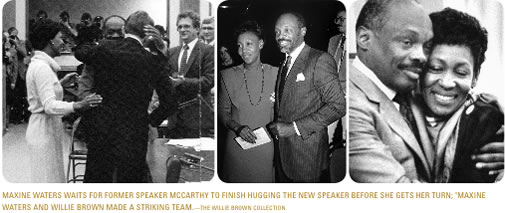
Kennedys
I met JFK. I didn’t know him. I was just a kid in 1960, just starting out in politics. I was a candidate for the county committee, and I won in the same year Jack Kennedy won the presidency. I traveled with RFK. He was the constant political type who was totally alive, literally, totally alive. He was completely enjoyable, taking off his jacket and rolling up his sleeves was natural for Bobby Kennedy and not an image thing. He was fulltime funny. He cracked as many jokes about you as you could crack about him and his family. Teddy is free flowing, fun loving, in every sense of the word, and a better speaker than either of the other two Kennedy brothers. Teddy let the old man in, so to speak, as Rusty Areias would say. I think they pulled him off the Obama trail (note: our conversation with Willie regarding the Kennedys took place before the grim news on Senator Kennedy’s health). He made the big announcement and they immediately dispatched him to California and he only appeared at one rally, before they substituted his niece, Caroline, because he was not resonating...you know you’re talking change and you bring in a dinosaur. It doesn’t work.
Maxine Waters
In many ways Maxine Waters was the most complementary partner to Willie in the California Legislature. An intense and driven legislator with a powerful personality, Waters is also a clever orator and appreciates the importance of being stylish. She is a few years younger than Willie, and they have enjoyed a long friendship. Ms. Waters has been in the United States Congress since 1991.
In my book I mentioned my annoyance at Anne Coulter saying had it not been for affirmative action Maxine Waters would never have a job in which she didn’t wear a paper hat. Well, that was not just against Maxine. That was a slam on all African Americans who have risen to the level of being something other than a waiter or a chef or a maid. It wasn’t just Maxine she was slamming. She was slamming all of us. It was a gross expression of racism which doesn’t happen to be anything but a perpetuation of a misrepresentation. We have not become desensitized to this. Otherwise you wouldn’t have had Imus being fired-or Jimmy the Greek would not have been dumped in the sports world and Trent Lott would still be the leader of the Republican arm of the Senate. What triggers major reactions, I don’t know. I don’t think anybody ever takes Ann Coulter seriously. They may take the other people seriously. I don’t know. I think everybody knows she is kind of an insignificant, raving nonsense personality. I think to elevate her comments would only enhance her status, rather than do anything to alter the landscape.
Bill Clinton
Democratic lightening rod and former President of the United States.
Bill Clinton is an absolute genius. I never met anybody with a greater recall of facts, faces and names. I never met anybody who could engage in dialogue on subject matters involving history and public policy as efficiently and as comprehensively as Bill Clinton. He is into socializing like you would not believe. He can talk at length and with depth on any subject to any person. I don’t share the view about any limitations on his status among the great presidents.
He is my favorite living politician. Phil Burton is my favorite politician ever, with Unruh a very close second and with Bob Moretti a very close third.
But let me tell you, Bill Clinton is awesome. He is awesome. I am literally alarmed that he was castigated about comments he made that have been painted as racist when he suggested that Obama won in South Carolina because of the Black vote. Bill Clinton is no racist. He did exactly what I would have done. If somebody had said to me, Ammiano (gay candidate for the Assembly) won the Castro, I’d say, he should have. Gays vote for gays. That’s not being homophobic...if they said Leland Lee beat you in Chinatown. Well, of course, he should have. Chinese vote for Chinese. That is not being anti-Asian. So, to attribute that role to Bill Clinton is an incredible disservice, and I hope at some point the Obama world will acknowledge that in fact Bill Clinton is not a racist.
Cesar Chavez
Born in Arizona and recognized worldwide for the labor movement he founded, he is claimed as a California favorite son.
Cesar was a fabulous labor leader. Devoted, incredible and, this might surprise you, he gave me the single largest contribution I ever received as a politician. Cesar gave me a quarter of a million dollars for my candidates in, I think, 1982 or 1984. I marched with Cesar in the 1960s. I raised money at every Democratic convention. I passed the bucket from the podium on behalf of the Farm Workers. Cesar was unbelievably dedicated, but I don’t get together socially with any of those ‘cause’ people. I get together socially with people who make me laugh or have many diverse interests.
GAVIN NEWSOME
The Mayor of San Francisco and possible gubernatorial candidate. His career was jump-started when Willie appointed him to the Board of Supervisors.
I’m disappointed in his insufficient appreciation.
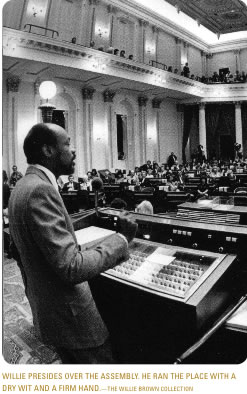
Antonio Villaraigosa
The Mayor of Los Angeles and the former Speaker of the California Assembly.
Antonio has a great future. In 1994, he was in the freshman class, and I was looking for the next generation of leaders knowing that in 1996 I would be term limited out of the Assembly. I assessed the incomers, the incoming freshmen, and concluded that either Kevin Murray or Antonio would ultimately be the young guard who could possibly replace me. I sat the two of them down and told them you guys ought to figure it out, but one or the other of you will be the speaker...period. I said you’ve got the personality, which is one of the first requirements, and that isn’t something you can make up. I said each of you has the operational skills. You’re interested in campaigns. You’re interested in voter registration. You’re interested in polling. You’re interested in what other members think. You each have a fundraising capacity because you demonstrated that by getting yourself elected. Now you ought to generate a relationship with your fellow members and when I leave in 1996, one of you will replace me.
I don’t think Antonio has hurt himself much politically in the last year with the relationship with the reporter or the divorce. Those personal things don’t hurt you like they might have once. It might have been difficult personally but it was a recoverable offense politically.
Willie is now 74 years old. He lives in a penthouse apartment in a beautiful section of his beloved San Francisco. He works out regularly, finally having the time and the inclination for the first time in his life, and his health is excellent, although he jokes he should have been dead five years ago. He eats virtually all of his meals in restaurants. He has never been drunk, but enjoys a healthy glass of wine with his lunch and profanely mocks those who don’t join him.
He is extraordinary company.




